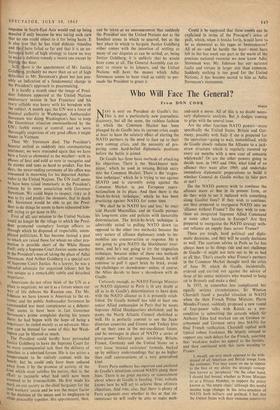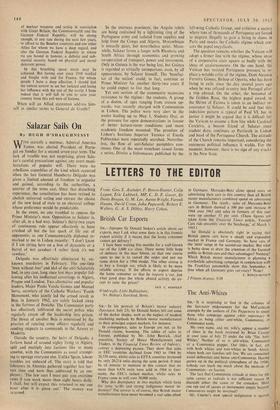Who Will Face The General?
From DON COOK PARIS
NATO is next on President de Gaulle's list. This is not a particularly new journalistic discovery, but all the same, the ruthless fashion in which the Common Market has been plunged by, de Gaulle into its current crisis ought at least to have the salutary effect of alerting the NATO partners to the need to face up to their own coming crisis, and the necessity of pre- paring some hard-boiled diplomatic positions before the battle is joined.
De Gaulle has three basic methods of attacking his objectives. There is the 'blockbuster tech- nique,' which he used in vetoing British entry into the Common Market. There is the 'stagna- tion technique,' which he is trying to use against SEATO and is currently using against the Common Market to put European supra- nationalism in its place. And then there is the 'brick-by-brick technique,' which he has been practising against NATO for some time.
'We shall be in NATO less and less,' he once told Harold Macmillan, and de Gaulle ptirsues his long-term aims and policies with inexorable determination. The brick-by-brick technique is admirably suited to pulling NATO down (as opposed to the other two methods) because the very nature of alliance diplomacy . tends to im- mobilise any counter-action or response. He is not going to give NATO the blockbuster treat- ment, and he's not going to try the stagnation technique, because either of these two methods might invite action or response. Instead, he will continue to pull it apart brick by brick, avoid- ing challenges or showdowns—unless, of course, the Allies decide to, have a showdown with de Gaulle.
Curiously enough, no NATO Foreign Minister or NATO diplomat' in Paris is in any doubt at all as to de Gaulle's determination to have done with the NATO alliance as it is presently estab- lished. De Gaulle himself has told at least one senior Allied ambassador in Paris that he wants Supreme Allied Headquarters abolished, and he wants the North Atlantic Council abolished as well. He is perfectly content to see the Scan- dinavian countries and Greece and Turkey hive off on their own in the not-too-distant future, and he envisages in place of NATO a series of great-power bilateral pacts involving Britain, France, Germany and the United States on a very loose 'mutual assistance' formula, backed up by military understandings that go no higher than staff conversations of a very generalised kind.
Every Paris embassy has reported and analysed de Gaulle's intentions toward NATO along these lines. There is no great mystery or concealment about where de Gaulle is heading. True, nobody knows how he will act to achieve these ultimate objectives. And true, also, that there is plenty of Paris argument over whether in this or that cir- cumstance he will really be able to make suoh-
and-such a move. All of this is no doubt neces- sary diplomatic analysis. But dodges coming to grips with the central issue.
Are the other fourteen NATO powers—more specifically the. United States, Britain and Ger- many, possibly with Italy if she is prepared for the operation—going to wait, immobilised, while de Gaulle slowly reduces the Alliance to a jack- straw structure which is regularly covered up every six months with a new coat of semantic whitewash? Or are the other powers going to decide 'now, in 1965 and 1966, what kind of an alliance they want after 1969, and undertake immediate diplomatic preparations to build it whether General de 'Gaulle wishes to take part or not?
Do the NATO powers wish to continue the alliance more or less in its present form, or do they wish to see it replaced with something along Gaullist lines? If they wish to continue, are they prepared to reorganise NATO into an 'alliance without France'? Do they wish to con- tinue an integrated Supreme Allied Command at some other location in Europe? Are they prepared to reorganise the NATO strategy with- out reliance on supply lines across France?
These are tough, hard pOlitical and diplo- matic decisions, and they will be costly decisions as well. The cautious advice in Paris so far has always been to let things ride and not challenge de Gaulle—it might not turn out to be as bad as all that. That's exactly what France's partners in the Common Market thought until the crisis of June 30, which de Gaulle, incidentally, ordered and carried out against the advice of three of his senior ministers who wanted to hang on in Brussels and make ,a deal.
In 1955, in somewhat less complicated but equally serious circumstances, Sir Winston Churchill faced a parallel situation in NATO when the then French Prime Minister, Pierre Mendes-France, suddenly proposed a new round of four-power talks with Russia as a pre- condition to submitting the accords which Sir Anthony Eden had worked out on German re- armament and German entry into NATO for final French ratification. Churchill replied with typical robust frankness. He bluntly refused to support any such delays for the French. asserting that 'weakness makes no appeal to the Soviets,' and then continued with this stern warning to France: myself. am very much opposed to the with-
drawal of all American and British troops from the continent. You may count on me to oppose to the best of my ability the strategic concep- tion known as 'peripheral.' On the other hand, I should feel bound, whether as Prime Minister or as a Private Member, to support the policy known as 'the empty chair,' although this would
• involve large changes in the infra-structure of NATO, both military and political. I feel that the United States with their immense superiority of nuclear weapons and acting in association with Great Britain, the Commonwealth and the German Federal Republic, will be strong enough, at any rate during the next few years, to afford to the Benelux countries and our other Allies for whom we have a deep regard, and also the German Federal Republic to whom we are bound in honour, a definite and sub- stantial security based on physical and moral deterrent power.
In this breathing space much may be achieved. But having ever since 1910 worked and fought with and for France, for whose people I have a deep affection, I should feel the utmost sorrow to see her isolated and losing her influence with the rest of the world. I hope indeed that it will fall to you to save your country from this evil turn of fortune.
When will an Allied statesman address him- self in similar terms to General de Gaulle?





























 Previous page
Previous page